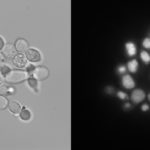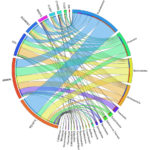Yarrowia lipolytica is a tantalizing microbial factory, capable of turning abundant biomass carbohydrates—glucose and xylose—into fatty acids that could be used for renewable fuel. In fact, lipids can make up more than 90 percent of the microbe’s dry weight.
In order to better harness these gobs of energy, a team of researchers sought to disrupt every gene in the genome with CRISPR-Cas9 in order to interrogate each one’s function. However, the team first needed to fix a defect in the approach: CRISPR-Cas9 relies on RNA with a short guiding sequence (20 bp) that directs the endonuclease where to cut, but these “single guide” RNAs (sgRNAs) can be faulty. Without a good sgRNA, Cas9 is ineffective and leaves the target gene intact: a false negative if the gene is actually essential.
Through the JGI’s Community Science Program, the scientists thus set out to identify which sgRNA sequences were reliable. Click here to read the science highlight on the JGI website.






